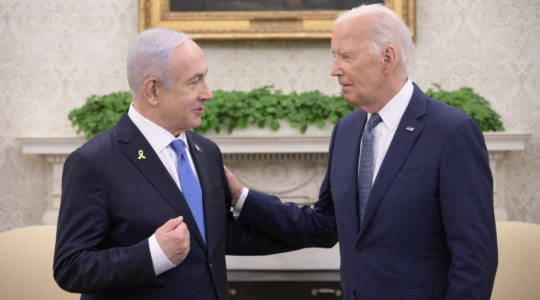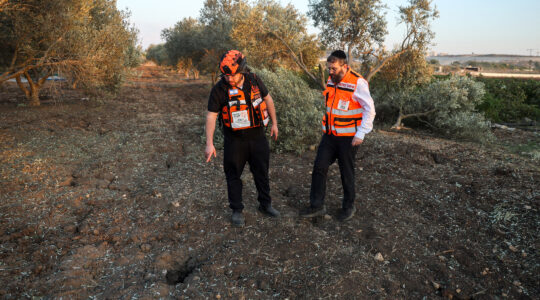JERUSALEM (JTA) – More than a week of unabated Kassam rocket attacks on Sderot has created a huge policy dilemma for the Israeli government: What should it do to stop radical Gaza-based militiamen from firing missiles on Israeli civilians and causing pandemonium in the border town of 22,000?
Should it target radical Hamas leaders and operatives from the air, or move large ground forces into Gaza to push the missile launchers out of range? Involve the international community or go it alone? Declare Gaza an enemy state or keep open options for early accommodation? Try to smash the Hamas-led Palestinian government or negotiate with it?
Prime Minister Ehud Olmert, heavily criticized for taking precipitate action against Hezbollah in Lebanon last summer, so far has committed only limited air power. But other voices inside and outside his government are calling for more radical action, and the prime minister is under growing pressure to make a major move.
On Sunday, after a sustained six-day barrage in which Palestinian gunmen fired approximately 150 rockets at Israeli civilians in the Gaza area, the government decided to step up its air attacks on Hamas and Islamic Jihad, but not to authorize any major ground operation.
Anyone actively involved in terror – Hamas and Islamic Jihad militiamen and senior officials who give them orders – would be potential targets for assassination from the air. The air force also would be free to strike at Hamas and Islamic Jihad bases, weapons’ stores and Kassam-manufacturing shops. At the same time, the government would continue to prepare international opinion for a wide ground operation.
But this might not be enough for the hawkish Yisrael Beiteinu party. On Sunday, Strategic Affairs Minister Avigdor Lieberman threatened to pull Yisrael Beiteinu from the coalition unless the government took serious steps to crush Hamas.
“Either the government dismantles Hamas or the government will be dismantled,” he warned.
Few political observers are taking Lieberman’s threat seriously, for now. However, if the crisis escalates and he does withdraw from the coalition, that probably would be enough to trigger a process leading to new elections.
Most military experts agree that the only way to stop the Kassams is through a major ground operation. They acknowledge, however, that it would come at great cost in terms of Israeli military casualties, Palestinian humanitarian suffering, international opinion and economic losses.
Moreover, the Israeli army would be deflected from the intensive rehabilitation program for its ground forces that was instituted after last summer’s Lebanon war. It also would mean the final collapse of what is left of the cease-fire and redoubled Palestinian attempts to launch a new round of suicide bombings.
Worse, the fighting could get out of hand and lead to a wider war involving Lebanon and possibly Syria.
Still, many strategic thinkers believe the government needs to radically alter its thinking on Gaza. Former National Security Adviser Giora Eiland, for example, argues that Israel should define Gaza as an enemy state with which it is at war.
That would mean no movement of goods or people across the borders; all Gaza state institutions and personnel would become targets; Israel could announce deadlines for stopping the flow of electricity, water and fuel into Gaza, giving the Gazans time to make other arrangements; and reserve the right for Israel to reoccupy parts of Gaza, like the Philadelphi route to stop the flow of weapons from Egypt into Gaza, and Beit Hanun, to push the Kassams out of range.
As much as the government is worried about the Kassams, it is even more concerned about the flow of arms through tunnels under the Philadelphi route along the border between Egypt and Gaza.
Senior Israeli officers predict that unless something is done to stop the flow of weaponry into Gaza, Hamas as the main recipient will be able to field a formidable military machine within a year. Tons of arms, including anti-tank weapons, Grad ground-to-ground rockets, anti-aircraft missiles and high explosives are said to be pouring into Gaza on a daily basis.
The Israeli military is concerned as well by increasing numbers of Hamas militiamen slipping across the border into Egypt and making their way to Iran for training. The Israel Defense Forces estimates that unless the arms flow is staunched, it won’t be long before Hamas is able to strike at Israeli civilian targets as far away as Beersheba, 30 miles from Gaza.
It is this buildup and the potential future threat that is leading people like Eiland to think in terms of a pre-emptive strike and/or other far-reaching moves that change the rules of the game.
Foreign Minister Tzipi Livni is pressing for the deployment of an international force on the Palestinian side of the border to stop the smuggling. In a break from Israel’s traditional opposition to any international presence in Palestinian territory, she envisages a force modeled along the lines of the 11,000-strong UNIFIL contingent patrolling the Lebanese border with Israel, with a similarly “robust” mandate to stop arms smuggling from Egypt into Gaza.
In a mid-May meeting with foreign ambassadors in Jerusalem, Livni actually put the ball in the international community’s court.
“We are ready to consider such a force, but will you be ready to provide it?” she challenged the assembled dignitaries.
Israeli officials acknowledge that getting the international community to intervene in this way will be a hard sell. But they maintain that if the community doesn’t move to stop the arms smuggling, it won’t be in a position to point fingers if and when Israel does.
Much of the debate in Israel suggests impending escalation. But there are voices, including some in the Labor Party, saying that Israel ought to rethink its diplomatic boycott of Hamas and agree to talk to the radical organization. They argue that unilateral moves have proved a failure and President Mahmoud Abbas of the more moderate Fatah movement has shown he cannot deliver, whereas Hamas would be able to make a deal with Israel stick.
What would there be to talk about?
A long-term hudna, or cease-fire – 10 or even 20 years – in return for Israeli withdrawal from most of the West Bank and the establishment of a Palestinian state in the West Bank and Gaza.
With the Kassams still whistling across the border, however, that seems a long way away.

Help ensure Jewish news remains accessible to all. Your donation to the Jewish Telegraphic Agency powers the trusted journalism that has connected Jewish communities worldwide for more than 100 years. With your help, JTA can continue to deliver vital news and insights. Donate today.





